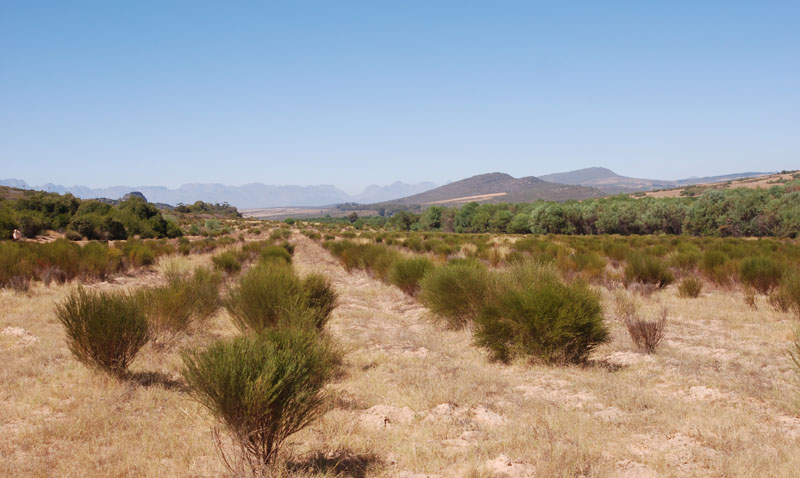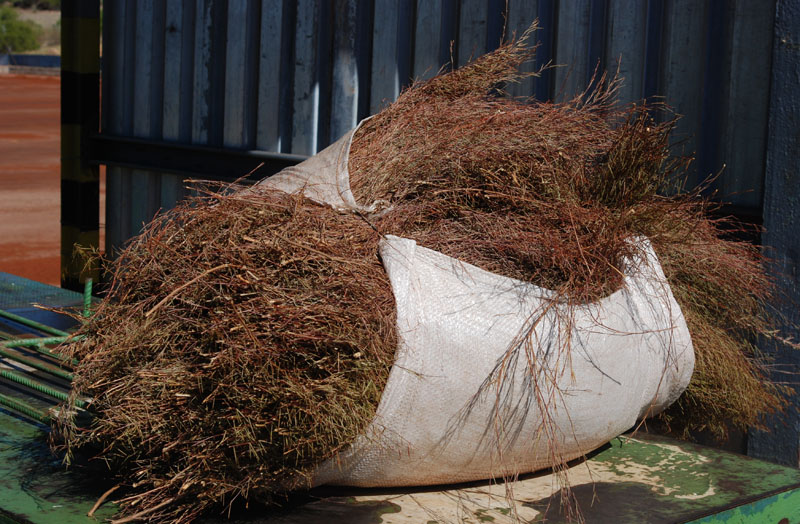South African Brewers See Red Over Pending Patent
A patent that threatens to curb creativity is angering South African microbrewers. The patent, which is pending in over 80 countries, would prohibit the use of certain endemic South African plants in the production of beer, wine and cider unless brewers obtain a license. The plants in question are from the Fabaceae family, which includes rooibos (red bush), known for its anti-oxidant properties and most commonly used as a tea. Rooibos grows solely in a mountainous region about 150 miles north of Cape Town, the epicenter of South Africa’s beer renaissance.

Rooibos grows solely in a mountainous region about 150 miles north of Cape Town. (Photo by Lucy Corne)
The beer scene here started fairly conservatively back in 2007. Most microbrewers began with something South Africans would find familiar—a light lager, a blond ale or, if they were feeling particularly daring, perhaps a stout of some sort. Since then, the originals have been joined by an array of IPAs, bitters, weissbiers and even the odd Belgian-style dubbel. But, with local ingredients severely limited (pale or dark malt plus a handful of hop varieties, all produced by SAB), it’s been tough to create a beer that is distinctly South African. So brewers have turned instead to other ingredients to give their brews a local flavor, with five breweries currently producing rooibos-infused beers around the country.
Beer fans are divided on whether the plant really has a place on the brew sheet—its flavor is earthy and, for some, reminiscent of pipe tobacco. If brewers are heavy-handed, rooibos will leave behind a tannic finish that many find to be an unpleasant end to their pint.
However, getting drinkers to consume the beer is not the primary concern of those currently using rooibos to flavor their brews. A bigger worry is being allowed to use the plant in the first place.
Red Dawn IP Holdings, the company behind the pending patent, is an amalgamation of two South African wineries, Audacia and KWV. Its patent covers an “improved process” that utilizes the preservation properties of rooibos—and its sister plants—primarily to replace the use of sulfur in winemaking. However, the patent also covers the use of the endemic plants during the fermentation stage of cider and beer, something that angered many brewers in the country.
“To try to take something as uniquely South African as rooibos for yourself just goes against everything the craft industry stands for,” says Susan Kruger of the Independent Beer & Spirits Co., one of the breweries currently producing a rooibos-infused beer. Others agree and are continuing to produce their beers while taking legal advice to see if their methods infringe on the method-specific limits of the patent. Red Dawn Holdings is inviting microbreweries to apply to brew rooibos beer under license, with Stellenbrau, near Cape Town, producing the first–and, to date, only–rooibos beer licensed by the winemakers.
In 2014, the term rooibos won “geographic indication status,” akin to that enjoyed by Champagne, following attempts to trademark the name in Europe and the U.S. But brewers and drinkers alike feel that the move to restrict the use of rooibos–a plant that South Africans consider a part of their national identity—in beer is a step too far. “This patent, if approved, will take a proudly South African product away from local brewers who want to use it,” says Dave Martin of Smack Republic Brewing Co. in Johannesburg, whose rooibos and honey-infused pale ale is a big hit with customers.
Red Dawn has defended the patent, claiming that it simply seeks to ensure that beers brewed using rooibos are of the highest standard. Critics, however, suspect it’s just a way for longstanding winemakers to muscle in on the new and rapidly growing beer industry.


Proof of precedence of the idea has been documented when beer was brewed with rooibos in 2008, well before the said patent was formally published.
The final decision on the “validity” of this patent could require detailed research and discovery of evidence into the matter. The process of registering the “Patent” in 80 countries is being watched, not only be the craft brewers in South Africa, but also the wider international brewing industry.